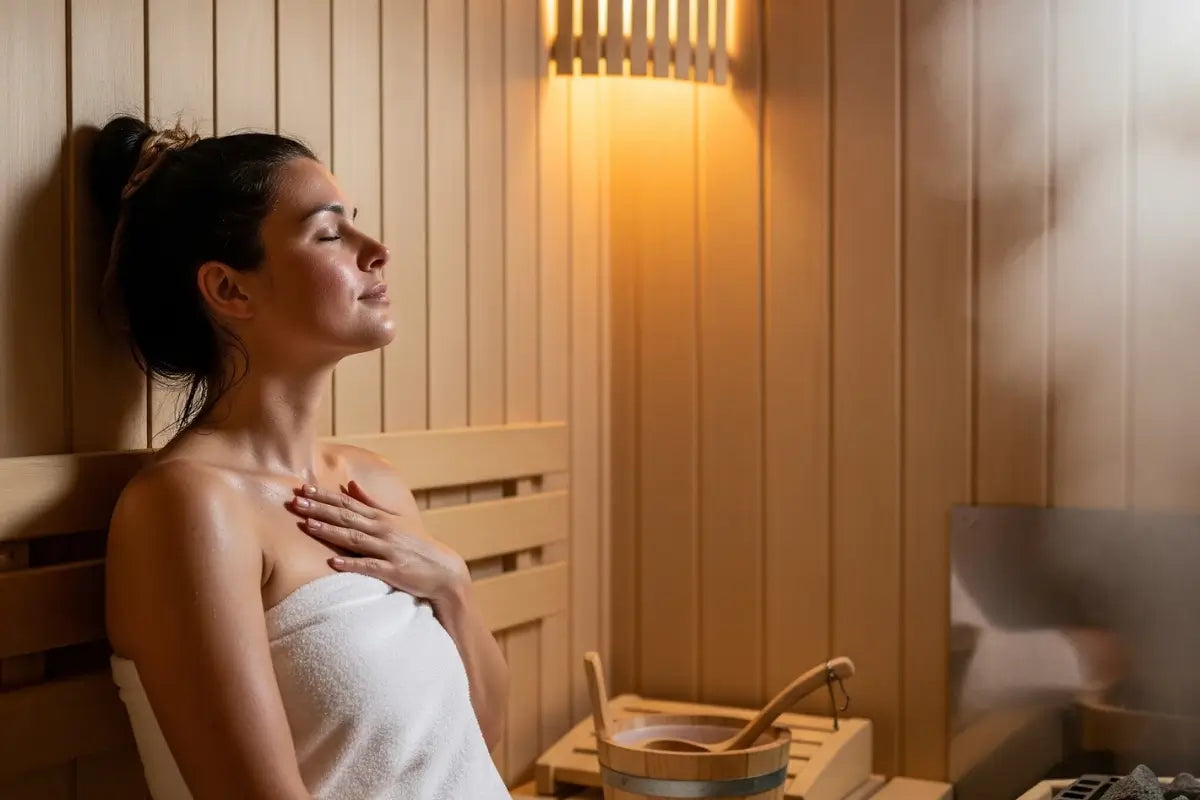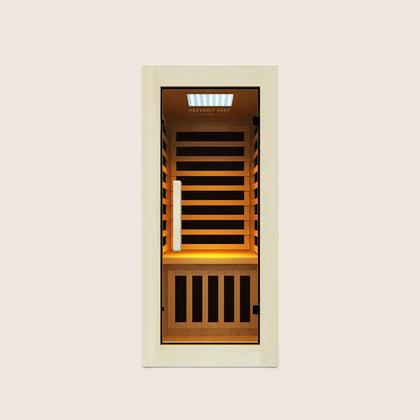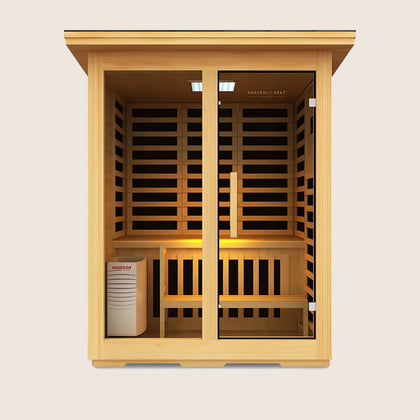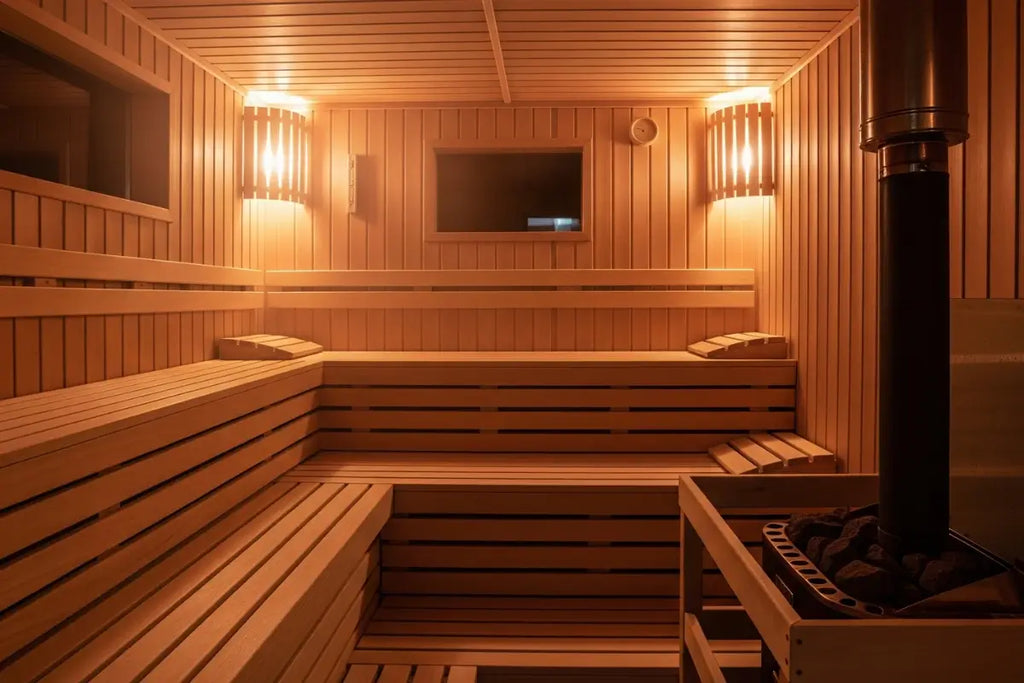Can I Use a Sauna With Atrial Fibrillation?

If you have atrial fibrillation, you might wonder if using a sauna is safe. Saunas feel relaxing, but the heat can affect your heart in tricky ways.
This guide will help you understand the risks and how to enjoy a sauna safely without putting your heart under too much stress.
Table of contents
Key Takeaways
-
Consult your cardiologist before using a sauna to ensure it’s safe for your AFib and medications.
-
Limit sauna sessions to 10–15 minutes at moderate temperatures (120–140°F / 50–60°C) to reduce heart strain.
-
Stay well-hydrated before, during, and after sauna use to prevent dehydration and electrolyte imbalances.
-
Avoid alcohol and stimulants like caffeine when using a sauna, as they can trigger irregular heart rhythms.
-
Stop sauna use immediately if you feel dizziness, chest pain, rapid heartbeat, or severe discomfort to protect your health.
What Is Atrial Fibrillation?
- Your Heart Loses Its Usual Beat: In atrial fibrillation, the heart’s top chambers send fast, messy signals that confuse the normal heartbeat and throw off its natural rhythm.
- This Irregular Beating Pushes the Heart Too Hard: When your heart beats like this all the time, it tires itself out and works less effectively, putting extra strain on the heart muscle.
- A Stroke Can Happen When Blood Doesn’t Flow Right: Because the heart isn’t pumping properly, blood can swirl and form clots, these can travel to the brain and cause a stroke.
- High Blood Pressure and Stress Can Trigger It: Things like aging, thyroid problems, sleep issues, drinking too much, or even just being under a lot of stress can kickstart these irregular heart signals.
Can I Use a Sauna With Atrial Fibrillation?
- Some people with AFib can handle saunas if they’re careful: If you have atrial fibrillation, you might still enjoy saunas safely by keeping sessions short, staying hydrated, and avoiding extreme heat.
- Using a cooler sauna puts less stress on your heart: Infrared saunas or warm rooms (not too hot) are much gentler on your body than the intense heat of Finnish-style saunas.
- Sauna heat acts like light exercise for your heart: The warmth slightly raises your heart rate and improves blood flow similar to what happens during a brisk walk, which can be helpful if you’re not very active.
- Saunas might even reduce heart strain over time: Some studies show regular sauna use can lower BNP levels, a sign of heart stress suggesting it could support your heart when used wisely.
- Watch how your body reacts and talk to your doctor first: If you feel dizzy or your heart races, stop right away. Always check with your cardiologist to know what’s safe for your specific condition.

Risks and Contraindications of Sauna Use With Atrial Fibrillation
Sauna Heat Can Trigger Irregular or Rapid Heart Rhythms in AFib
Heat stresses the cardiovascular system , which may disrupt normal heart rhythms in people with AFib.
High sauna temperatures increase the chance of arrhythmias by accelerating electrical signals and raising heart rate and blood pressure, putting extra strain on the heart.
High Temperatures Raise Heart Rate and Blood Pressure, Increasing Cardiac Strain
- Heat makes your heart beat faster to cool your body down: When you sit in a sauna, your heart works harder by pumping blood faster to help cool you off.
- Sauna heat can raise your blood pressure by tightening blood vessels: High temperatures cause your blood vessels to squeeze, which can temporarily increase your blood pressure.
- High heart rate and blood pressure can cause dizziness and irregular heartbeat: Feeling dizzy, faint, or having a weird heartbeat are signs your heart is under too much stress.
- These changes put extra strain on a heart with atrial fibrillation: If you have AFib, the faster heartbeat and higher blood pressure from sauna use can make your condition worse.
- Using very hot saunas may increase the risk of heart problems for AFib patients: Because of the extra strain, very hot saunas could be dangerous for people with atrial fibrillation.
Excessive Sweating May Cause Dehydration and Electrolyte Imbalance
Sweating causes fluid and electrolyte loss, essential for maintaining a steady heart rhythm.
Dehydration may worsen AFib symptoms and lead to dizziness or fatigue. Staying well-hydrated is critical to avoid these issues.
AFib Patients May Struggle to Tolerate Intense Sauna Heat
- Intense heat makes it hard for AFib hearts to adjust: Many people with AFib find intense sauna heat uncomfortable because their hearts have a harder time adjusting.
- Heat can cause the heart to beat irregularly: The heat can worsen irregular heart rhythms by affecting the nervous system and heart rate in AFib patients.
- AFib patients may feel palpitations, breathlessness, or dizziness: During sauna sessions, AFib patients might experience palpitations, shortness of breath, or lightheadedness.
- Keeping sauna heat low and sessions short helps AFib patients: Experts recommend lower temperatures and shorter sauna sessions for safety.
- Watch for chest pain or dizziness and stop sauna if needed: It’s important to stop sauna use if you feel warning signs like chest pain or severe dizziness.
Sauna Use Can Interfere with Common AFib Medication Effects
- Sauna heat can change how AFib medicines work: Sauna heat and dehydration may affect how your body handles medications like blood thinners, changing the levels of these drugs in your blood.
- Sauna can cause blood pressure changes that affect medicine: Using a sauna can cause your blood pressure to go up or down, which may interfere with how your AFib medications work and increase risks.
Heat-Induced Vasodilation Can Cause Sudden Dizziness or Fainting
Heat causes blood vessels to widen, potentially lowering blood pressure rapidly, which may cause dizziness or fainting, especially in those with AFib. Standing up too fast after sauna use can increase this risk.
Unstable or Severe AFib Increases Risk of Dangerous Sauna Reactions
- Unstable AFib makes sauna use more dangerous: If your atrial fibrillation is unstable or severe, sauna use carries higher risks. Heat can trigger dangerous arrhythmias causing palpitations, chest pain, or fainting.
- Sweating and hot sauna increase heart problems: Dehydration from sweating makes arrhythmia episodes more frequent and intense. Very high sauna temperatures raise the chance of bad reactions.
- People with severe AFib should skip saunas for safety: For severe AFib, staying away from saunas is often the safest choice. Always check with your doctor before trying sauna therapy to avoid life-threatening problems.
Can Sauna Sessions Trigger Atrial Fibrillation Episodes?
- Heat can speed up your heart and cause irregular beats: High heat makes your heart’s electrical signals faster and can cause dehydration, both of which might trigger AFib episodes or palpitations.
- Switching quickly from hot to cold can upset your heart rhythm: Jumping from a hot sauna into a cold plunge can increase the chance of irregular heartbeats.
- Short sauna sessions at moderate heat are safer with doctor’s approval: If you have AFib, brief sauna use at lower temperatures can be safer but should be done with medical guidance and monitoring.
How to Use a Sauna With Atrial Fibrillation?
Consult Your Cardiologist to Confirm Sauna Use Is Safe for You
Before using a sauna, confirm with your doctor that it’s safe for your condition and medications. Tests like ECG or stress tests may be advised.
Limit Sauna Sessions to 10–15 Minutes to Avoid Heart Stress
Keep sauna sessions brief, around 10 to 15 minutes, and temperatures moderate (about 120–140°F / 50–60°C).
Avoid higher heat unless approved by your physician. Even shorter sessions, when done a few times a week, can still support heart health and lower cardiovascular risk, especially when paired with regular exercise, so consistency matters more than duration.
Stay Well-Hydrated to Prevent Dehydration and Blood Pressure Fluctuations
Before, during, and after sauna use, stay hydrated to maintain your fluid and electrolyte balance.
For lighter or shorter sessions, water usually does the job, but if you sweat a lot or stay longer, drinks with electrolytes work better. Avoid alcohol and stimulants like caffeine, which can trigger irregular heartbeats.

Avoid Alcohol and Stimulants That May Trigger Irregular Heart Rhythms
- Alcohol Can Make Your Heart Beat Irregularly in the Sauna: Alcohol makes your blood vessels wider and your heart beat faster, which can cause irregular heart rhythms when you’re in the sauna.
- Drinks Like Coffee and Energy Drinks Can Upset Your Heart: Caffeine and energy drinks excite your heart and may trigger irregular heartbeats while using the sauna.
- Even One Drink Can Cause Heart Problems: Having just a small amount of alcohol can still cause issues with your heart rhythm during sauna time.
- Avoiding These Helps You Enjoy the Sauna Safely: Knowing how alcohol and stimulants affect your heart helps you prevent problems and relax safely in the sauna.
Choose a Sauna with Lower Temperatures to Reduce Cardiovascular Strain
- Using Lower Heat Helps Your Heart: Choosing a sauna with lower temperatures makes it easier on your heart if you have AFib. Saunas set around 120–140°F (50–60°C) warm your body gently without stressing your heart too much.
- High Heat Can Make Heart Problems Worse: Very hot saunas (above 160°F or 70°C) put extra strain on your heart and may cause irregular heartbeats. Avoid these unless your doctor says it’s okay.
- Mild Heat Lets You Stay Longer and Feel Better: Lower heat means you can enjoy longer sauna sessions comfortably while keeping your heart stable. Always pay attention to how you feel and don’t stay too long, even in milder heat.
Cool Down Gradually to Avoid Sudden Heart Rate or Pressure Changes
After the sauna, cool down slowly to prevent sudden blood pressure changes that could trigger symptoms.
Monitor Your Heart Rate Closely for Any Signs of Irregularity
Use wearable monitors or check your pulse regularly to detect irregularities early. Stop sauna use immediately if you experience symptoms such as dizziness, palpitations, chest discomfort, or shortness of breath.
How Long Can Someone With Atrial Fibrillation Safely Stay in a Sauna?
Experts recommend limiting sauna sessions to 10–15 minutes to minimize heart strain. Longer exposure, especially in high heat, increases arrhythmia risk. Older adults should be particularly cautious and consult their cardiologist.
What Symptoms Require Stopping Sauna Use?
Dizziness or Lightheadedness Indicating Low Blood Pressure and Risk of Falling
- Heat Makes Blood Pressure Drop: Heat in the sauna makes your blood vessels widen, which lowers your blood pressure.
- Low Blood Pressure Makes You Feel Dizzy: When blood pressure is low, less oxygen goes to your brain, causing dizziness or feeling lightheaded.
- Feeling Dizzy Means You Should Stop Sauna Use: Dizziness is a warning that you could lose balance and fall, so you need to stop using the sauna right away.
- Sit Down and Leave Slowly to Avoid Falling: If you feel lightheaded, sit or lie down and leave the sauna slowly to stay safe.
- Ignoring Dizziness Can Cause Fainting or Injury: If you ignore dizziness and keep using the sauna, you might faint or get hurt.
Rapid or Irregular Heartbeat Showing Your Heart Is Under Too Much Stress
- Your Heart Beats Faster Because of Sauna Heat: The sauna heat makes your heart work harder to cool your body, causing your heartbeat to speed up or become irregular.
- Sauna Heat Can Cause Dangerous Heart Rhythm Changes: If you have heart issues like atrial fibrillation, the heat can trigger your heart to beat unevenly or flutter.
- Stop Using the Sauna If Your Heart Feels Irregular or Fast: If you notice your heart racing, fluttering, or beating unevenly along with feeling dizzy or anxious, you should leave the sauna right away.
- Leaving the Sauna Protects Your Heart from Harm: Ignoring these signs puts extra strain on your heart and increases the risk of serious problems, so it’s important to stop sauna use immediately.
Shortness of Breath or Chest Pain Indicating Possible Heart or Lung Trouble
- Sauna Heat Can Make Breathing Harder: The sauna’s heat makes your heart and lungs work harder, which can cause shortness of breath.
- Chest Pain Means You Should Stop Using Sauna: If you feel chest pain or tightness, it might be a serious heart issue, so stop using the sauna immediately.
- Difficulty Breathing or Chest Pain Needs Fast Action: If breathing gets hard or chest pain gets worse, stop the sauna and get emergency help right away.
Nausea or Vomiting Means Your Body Is Overheating and Struggling to Cool
- Nausea happens because your body is too hot: Feeling sick or vomiting means the sauna heat is making your core temperature rise too much.
- Your body struggles to cool down when overheating: The intense heat stresses your system and can lead to serious heat exhaustion.
- Stop the sauna as soon as you feel sick: Leaving the sauna immediately prevents more harm from overheating.
Severe Headache Caused by Dehydration or Excessive Heat Exposure
- Feeling a Strong Headache Could Mean You’re Dehydrated: A powerful headache during sauna use often happens because your body loses too much water through sweat and doesn’t get enough fluids back. This can make your brain slightly shrink and cause pain.
- Too Much Heat Can Make Headaches Worse: High temperatures inside the sauna can trigger migraines or make an existing headache feel even worse, especially if you're already sensitive to heat.
- A Headache in the Sauna Is a Clear Sign to Stop: If a headache starts while you're in the sauna, that’s your body telling you to get out and drink water. Ignoring it can lead to heat exhaustion or even heat stroke, so don’t push through the pain.
Confusion or Disorientation Signs of Heat Exhaustion Affecting Brain Function
- Feeling confused in the sauna means your brain is overheating: If you start feeling confused or disoriented in a sauna, it’s a sign that heat exhaustion is affecting your brain. High heat and dehydration reduce blood flow to your brain, making it harder to think or stay alert.
- Staying inside after confusion starts can be dangerous: This mental confusion is your body’s way of saying it can’t handle the heat anymore. You need to leave the sauna immediately to avoid serious health risks.
- If someone looks confused, get them out fast: When you notice someone else acting confused or out of it, help them exit and cool down right away. Don’t wait every minute matters when the brain is affected by heat.
- Dizziness and heavy sweating are early warning signs: Before confusion hits, your body usually gives warning signs like dizziness or sweating a lot. Pay attention to these signals they mean your brain might be next if you stay in too long.
Feeling Faint or About to Pass Out Means Impending Heat-Related Collapse
- If you feel faint, your body is starting to shut down from the heat: Feeling faint or like you're about to pass out inside a sauna is a serious warning sign. It means your body is overwhelmed by heat and struggling to stay stable.
- Heat and dehydration make it harder for your brain to get enough blood: Inside a sauna, heat widens your blood vessels and dehydration lowers blood volume. That combination reduces blood flow to your brain, which causes dizziness and lightheadedness.
- Feeling dizzy, weak, or lightheaded means you’re close to collapsing: Before collapsing, people often feel extremely lightheaded, unsteady, or suddenly weak. These are all signs that your body can’t take the heat any longer.

FAQs
Can using a sauna affect the effectiveness of blood-thinning medications commonly prescribed for AFib?
Sauna heat and dehydration may alter blood concentration of medications like warfarin, potentially changing their effects. Staying hydrated and monitoring blood levels regularly are important for safety.
Does the type of sauna (dry sauna vs. steam sauna) make a difference for people with atrial fibrillation?
Steam saunas may feel gentler due to higher humidity, reducing dehydration risk, while dry saunas can be hotter and more dehydrating. Regardless of type, hydration is essential.
Are there specific precautions for older adults with atrial fibrillation when using a sauna?
Older adults should keep sauna sessions short (10–15 minutes) and temperatures moderate (70–80°C / 158–176°F). Always consult a cardiologist and watch for symptoms during use.
Can regular sauna use improve symptoms or quality of life for people with atrial fibrillation?
Some people find that regular, moderate sauna sessions improve relaxation, sleep, mood, and may reduce AFib episodes, but individual responses vary.





























